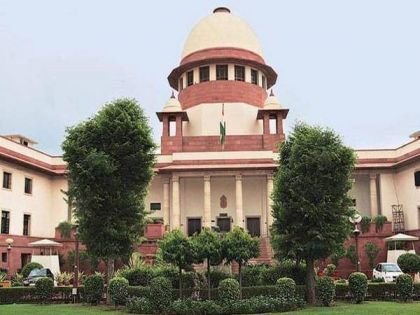SC asks petitioner to approach State HC regarding his plea challenging anti-conversion law in Madhya Pradesh
By ANI | Published: February 19, 2021 06:42 PM2021-02-19T18:42:13+5:302021-02-19T18:50:02+5:30
The Supreme Court on Friday allowed advocate Vishal Thakre to withdraw his petition and granted him the liberty to approach Madhya Pradesh High Court in connection with his plea challenging the recent law in the state prohibiting religious conversion of marriages.

SC asks petitioner to approach State HC regarding his plea challenging anti-conversion law in Madhya Pradesh
The Supreme Court on Friday allowed advocate Vishal Thakre to withdraw his petition and granted him the liberty to approach Madhya Pradesh High Court in connection with his plea challenging the recent law in the state prohibiting religious conversion of marriages.
A three-judge bench of the Apex Court, headed by Chief Justice of India (CJI) Sharad Arvind Bobde and also comprising Justices A S Bopanna and V Ramasubraman allowed to withdraw the plea.
The lawyer-cum-petitioner, Thakre, pleaded to the Top Court for withdrawing his petition from it, to which, the CJI led bench allowed his prayer and asked him, to approach the Madhya Pradesh High Court with his petition and prayers.
The Supreme Court was hearing the petition filed by Thakre challenging the "love jihad" law in Madhya Pradesh.
"You (Thakre) please approach the Madhya Pradesh High Court. A matter is already pending there. We would like to have the benefit of the High Court judgment," the CJI Bobde bench said today.
An ordinance that prohibits and punishes conversion by "misrepresentation, undue influence, coercion, marriage or any fraudulent means" was notified by the Madhya Pradesh government and came into effect on January 9, 2021.
The 'Madhya Pradesh Freedom of Religion Ordinance, 2020' prohibits religious conversion "by misrepresentation, allurement, use of threat or force, undue influence, coercion, marriage or any fraudulent means". It says any marriage conducted with the intention of religious conversion will be considered null and void.
According to the law, anyone desiring to covert will need to submit a declaration 60 days before in a prescribed form to the district magistrate, stating that he is doing so without any coercion and of his own free will.
Anyone found guilty shall be punished with imprisonment for a term which shall not be less than one year but which may extend to five years and shall also be liable to a fine which shall not be less than Rs 25,000, as per the law.
Under the law, anyone found guilty of the crime in respect of a minor, a woman or a person belonging to the Scheduled Castes or Scheduled Tribes shall be punished with imprisonment for a term which shall not be less than two years but which may extend to ten years and shall also be liable to fine which shall not be less than Rs 50,000.
In case of mass conversion, a person or persons shall be punished with imprisonment for a term which shall not be less than five years but which may extend to ten years and shall also be liable to fine which shall not be less than Rs 1 lakh, as per the law.
The law also says that in the case of a second or subsequent offence, the term of the imprisonment shall not be less than five years but may extend to ten years and there will also be a fine.
( With inputs from ANI )
Disclaimer: This post has been auto-published from an agency feed without any modifications to the text and has not been reviewed by an editor
Open in app